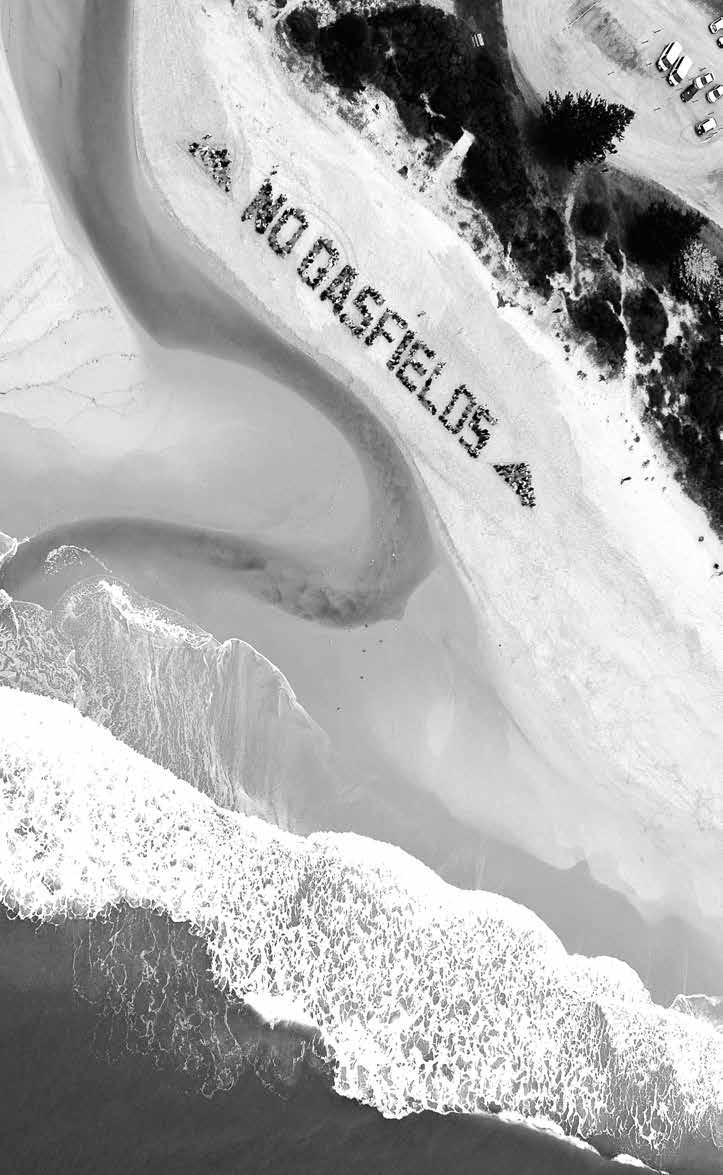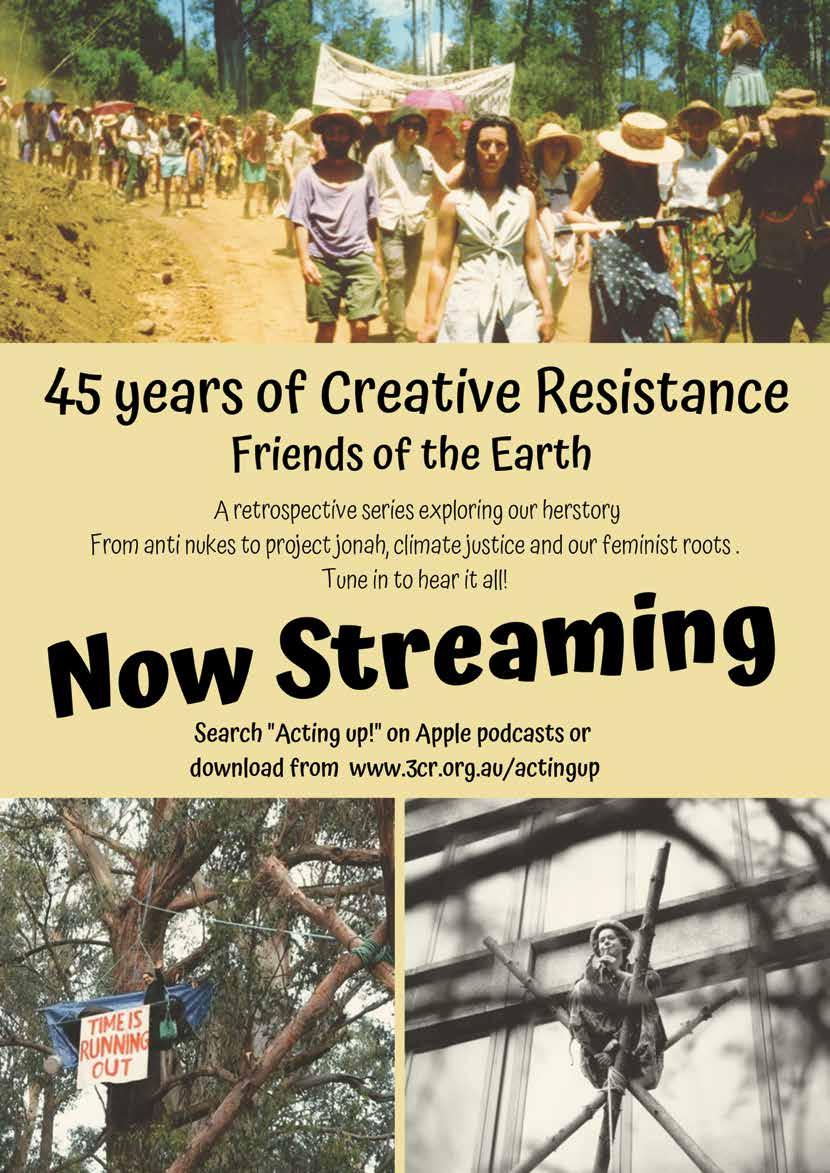
7 minute read
Australian nuclear dump decision trashes indigenous peoples’ rights – Jim Green and Michele Madigan
did, the second form of power comes into play. Ideational power refers to influencing the public agenda, for example with advertising and extremely well-funded submissions full of data and economic argument. Gas companies are also versed in instrumental power, using lobbying and other soft power to ensure that officials and politicians hear their voice above all others, as well as employing hard power through funding support, making threats and outright corruption. This power is partly exposed by Market Forces, another affiliate of Friends of the Earth, when it probes deeply into the annual reports and accounts of the gas industry and their financiers. It is fitting to end by referencing Eric Olin Wright’s book How to be an Anticapitalist. Wright (2019) tells us that campaigns against domestic and retail use of gas need to draw particularly on ideas of fairness to low income and vulnerable people, involving people in democratic decisionmaking, and relentlessly building community. Thinking about gas workers, democratic control over the pathways that businesses take to transition off gas becomes important. Although the climate crisis isn’t central to his thinking, Wright (2019) offers a vision of a future society should look like and ways of eroding capitalism and challenging state power. Human values and needs are central to his thinking, which he addresses through ideas about equality/fairness, democracy/liberty and community/solidarity.
References Aronoff, Kate, Alyssa Battistoni, Daniel Aldana Cohen and Thea Riofrancos (2019) A Planet to Win. Why We need a Green New Deal. Verso, London. Beyond Zero Emissions (2018) Zero Carbon Industry Plan: Electrifying Industry. http://bze.org.au. Cardoso, Andrea (2018) Valuation Languages Along the Coal Chain From Colombia to the Netherlands and to Turkey, Ecological Economics 146 (2018) 44–59. Edwards, Lindy (2019) Corporate Power in Australia. Do the 1% Rule? Monash University Publishing, Clayton. Energy Networks Australia (2017a) Reliable and Clean Gas for Australian Homes. www.energynetworks.com.au/sites/default/files/gas_for_australian_homes_october_2017.pdf Energy Networks Australia (2017b) Gas Vision 2050. www.energynetworks.com.au/gas-vision-2050. Energy Savings Industry Association (2019) Energy Efficiency Employment in Australia Report, ESIA. Available at: https://esia.asn.au/publications/esia-reports/esia-jobs-report-2018. Forcey, Tim (2016) ‘Hot summer nights, and cold winter evenings: how to be comfortable and save money all year long’ The Conversation. January 25 2016. https:// theconversation.com/hot-summer-nights-and-cold-winter-evenings-how-to-be-comfortable-and-save-money-all-year-long-51046 Garnaut, Ross (2019) Super-power. Australia’s low-carbon opportunity. LaTrobe University Press, Melbourne. Murphy, I. (2019) ‘Employment in oil and gas industry up by 17 per cent’, Energy Magazine, 26 June. Available at: www.energymagazine.com.au/employment-in-oil-and-gas-industry-up-by-17-per-cent/ Robertson, Bruce (2019) IEEFA update: The staggering cost of gas in Australia. July 15 2019. https://ieefa.org/the-staggering-cost-of-gas-in-australia/ Toscano, N. (2019) What really happened after the carmakers closed their doors? Available at: www.smh.com.au/business/the-economy/what-really-happened-after-the-carmakers-closed-their-doors-20190613-p51xdl.html. Walker, Cam (2018) The movements of the Australian environment movement. Chain Reaction. Issue 132, April 2018 Wright, Eric Olin (2019) How to be an Anticapitalist in the 21st Century. Haymarket Books. West, Michael (2020) Gas deal: “a massive transfer of wealth from gas customers to China and Singapore”. https://www.michaelwest.com.au/gas-deal-a-massive-transfer-of-wealth-from-gas-customers-to-china-and-singapore/ Accessed 8 March 2020
Advertisement
Australian nuclear dump decision trashes indigenous peoples’ rights
Jim Green and Michele Madigan
Earlier this year, the Saugeen Ojibway Nation voted against plans for a deep geological repository near Lake Huron. The Canadian government will respect the decision and will no longer target the site. Sadly, the situation in Australia is the exact opposite: Traditional Owners were denied a right to vote in a ‘community ballot’ concerning a national nuclear waste dump, and the federal government is proceeding with the dump despite their unanimous opposition. The federal government announced in February that it plans to establish a national nuclear waste ‘facility’ near Kimba on South Australia’s Eyre Peninsula. It will comprise a permanent dump for low-level nuclear waste, and an ‘interim’ store for long-lived intermediate-level waste. Shamefully, the federal government has decided to move ahead despite the unanimous opposition of the Barngarla Traditional Owners, native title holders over the area. The federal government refused a request from the Barngarla Determination Aboriginal Corporation (BDAC) to include traditional owners in a ‘community ballot’ held last year. So BDAC engaged the Australian Election Company to conduct a confidential postal ballot open to all Barngarla Traditional Owners. None of the respondents voted in favour of the dump. BDAC then wrote to the government calling for the dump proposal to be abandoned in light of their unanimous opposition, and stating that BDAC will take whatever steps are necessary to stop it being imposed on Barngarla Country against their will. The government’s ‘community ballot’ registered 55% support among eligible voters – thanks to a promised $30 million bribe and the implausible claim that 45 jobs will be created. But if the ‘community ballot’ is combined with the Barngarla ballot, the overall level of support falls to just 43.8% of eligible
voters (452/824 for the Kimba ballot, and 0/209 for the Barngarla ballot). That is a long way short of the government’s own benchmark for ‘broad community support’ of 65% “The only reason why there was a yes vote was because Barngarla were excluded, and this has then been used as the justification to allow the facility to be built, entirely ignoring Barngarla’s views,” a BDAC statement said. “The Barngarla stand with most of the farming industry against this proposal. However, the more important issue now is the fact that voting manipulation has allowed for the decision to occur.”
Racist legislation The National Radioactive Waste Management Act systematically discriminates against Australia’s First Nations. For example, the nomination of a site for a nuclear dump is valid even if Aboriginal traditional owners were not consulted and did not give consent. And the Act has sections which nullify or curtail the application of laws such as the Aboriginal and Torres Strait Islander Heritage Protection Act 1984, and the Native Title Act 1993. The federal government recently announced that it plans to amend the Waste Management Act. While the Act is sorely in need of an overhaul, the planned amendments aren’t those that are needed. Clauses in the Act that dispossess and disempower traditional owners will remain untouched. Indeed, the planned amendments will, if passed, further disempower traditional owners. Barngarla Traditional Owners are lobbying opposition and cross-bench federal parliamentarians regarding the flawed amendments. A recent report by the federal parliament’s Joint Committee on Human Rights found that the amendments could breach international law by failing to protect the human rights of Barngarla Traditional Owners and that the amendments pose a significant risk to their right to culture and self-determination.
Appalling process The South Australian Labor Party argues that traditional owners ought to have a right of veto over nuclear projects given the sad and sorry history of the nuclear industry in South Australia, stretching back to the British atomic bomb tests at Maralinga and Emu Field. Deputy Leader of the Opposition Susan Close says that South Australian Labor is “utterly opposed” to the “appalling” process which led to the announcement regarding the Kimba site. Compare that to the federal government, whose mind-set seems not to have advanced from the ‘Aboriginal natives shall not be counted’ clause in the Constitution Act 1900. As Barngarla Traditional Owner Jeanne Miller says, Aboriginal people with no voting power are put back 50 years, “again classed as flora and fauna.” The current debate follows a history of similar proposals – all of them defeated, with traditional owners repeatedly leading successful campaigns. In 2004, after a six-year battle, the Howard government abandoned plans for a national nuclear waste dump in SA. The Kupa Piti Kungka Tjuta – a senior Aboriginal women’s council – congratulated the government for belatedly getting their ‘ears out of their pockets’. In 2016, the plan to import high-level nuclear waste from around the world was abandoned after a Citizens’ Jury noted the lack of Aboriginal consent and concluded that “the government should accept that the Elders have said NO and stop ignoring their opinions.” And last year, the federal government abandoned plans for a national nuclear dump in South Australia’s Flinders Ranges, a plan that was fiercely contested by Adnyamathanha Traditional Owners. South Australian Premier Steven Marshall is rightly proud of his record promoting the growth of renewable energy in the state. And he’s proud of his significant role in putting an end to the plan to import high-level nuclear waste from around the world. But the Premier – whose portfolio includes Aboriginal Affairs and Reconciliation – supports the federal government’s nuclear dump plan. He needs, as the Kungkas put it, to get his ears out of his pockets and to respect the unanimous opposition of the Barngarla Traditional Owners. The fight goes on! More information: www.nuclear.foe.org.au/waste Jim Green is the national nuclear campaigner with Friends of the Earth Australia. Michele Madigan is a Sister of St Joseph who has spent the past 40 years working with Aboriginal people across South Australia.
Barngarla Traditional Owners at a protest against planned nuclear waste dumps, Port Augusta, 2016.






